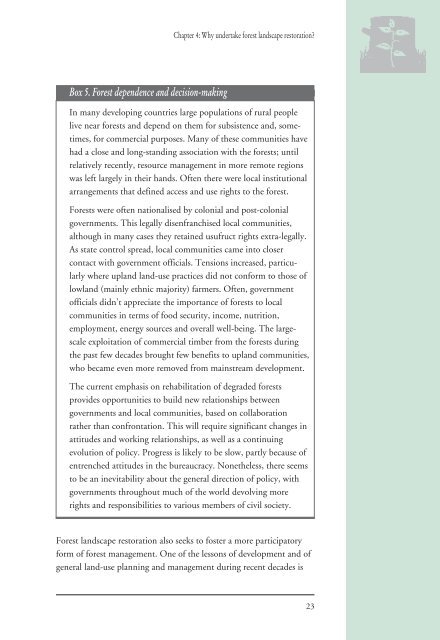Rehabilitation and Restoration Of Degraded Forests (PDF) - IUCN
Rehabilitation and Restoration Of Degraded Forests (PDF) - IUCN
Rehabilitation and Restoration Of Degraded Forests (PDF) - IUCN
Create successful ePaper yourself
Turn your PDF publications into a flip-book with our unique Google optimized e-Paper software.
Box 5. Forest dependence <strong>and</strong> decision-making<br />
Chapter 4: Why undertake forest l<strong>and</strong>scape restoration?<br />
In many developing countries large populations of rural people<br />
live near forests <strong>and</strong> depend on them for subsistence <strong>and</strong>, sometimes,<br />
for commercial purposes. Many of these communities have<br />
had a close <strong>and</strong> long-st<strong>and</strong>ing association with the forests; until<br />
relatively recently, resource management in more remote regions<br />
was left largely in their h<strong>and</strong>s. <strong>Of</strong>ten there were local institutional<br />
arrangements that defined access <strong>and</strong> use rights to the forest.<br />
<strong>Forests</strong> were often nationalised by colonial <strong>and</strong> post-colonial<br />
governments. This legally disenfranchised local communities,<br />
although in many cases they retained usufruct rights extra-legally.<br />
As state control spread, local communities came into closer<br />
contact with government officials. Tensions increased, particularly<br />
where upl<strong>and</strong> l<strong>and</strong>-use practices did not conform to those of<br />
lowl<strong>and</strong> (mainly ethnic majority) farmers. <strong>Of</strong>ten, government<br />
officials didn’t appreciate the importance of forests to local<br />
communities in terms of food security, income, nutrition,<br />
employment, energy sources <strong>and</strong> overall well-being. The largescale<br />
exploitation of commercial timber from the forests during<br />
the past few decades brought few benefits to upl<strong>and</strong> communities,<br />
who became even more removed from mainstream development.<br />
The current emphasis on rehabilitation of degraded forests<br />
provides opportunities to build new relationships between<br />
governments <strong>and</strong> local communities, based on collaboration<br />
rather than confrontation. This will require significant changes in<br />
attitudes <strong>and</strong> working relationships, as well as a continuing<br />
evolution of policy. Progress is likely to be slow, partly because of<br />
entrenched attitudes in the bureaucracy. Nonetheless, there seems<br />
to be an inevitability about the general direction of policy, with<br />
governments throughout much of the world devolving more<br />
rights <strong>and</strong> responsibilities to various members of civil society.<br />
Forest l<strong>and</strong>scape restoration also seeks to foster a more participatory<br />
form of forest management. One of the lessons of development <strong>and</strong> of<br />
general l<strong>and</strong>-use planning <strong>and</strong> management during recent decades is<br />
23

















